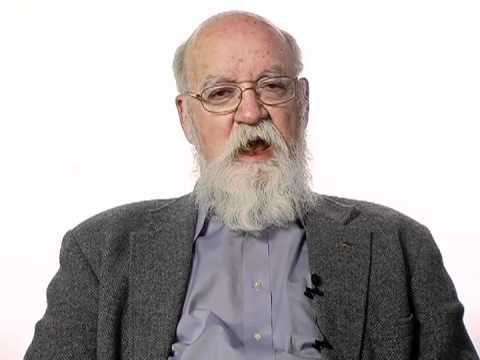Big Think
New videos DAILY: https://bigth.ink
Join Big Think Edge for exclusive video lessons from top thinkers and doers: https://bigth.ink/Edge
———————————————————————————-
Spirituality plays a different ballgame than science, so the language used in either of them doesn’t often match up to the other side. New York Times bestselling author and spiritual teacher Rob Bell posits that the two need each other to help describe this modern world. Whereas science deals with explaining cold hard facts, spirituality deals in vagueries that can often help the more human and emotional sides of us a lot more. For instance, grieving families of a plane crash don’t want to be told the plane crashed because the force of acceleration became less than the force of gravity — they want to be told that their loved ones are in a better place. Both science and spirituality are searching for the truth, says Rob Bell, and therein lies their similarities. Rob’s latest book is What Is the Bible?: How an Ancient Library of Poems, Letters, and Stories Can Transform the Way You Think and Feel About Everything.
———————————————————————————-
ROB BELL
Rob Bell is a New York Times bestselling author, speaker, and spiritual teacher. His books include Love Wins, How to Be Here, What We Talk About When We Talk About God, Velvet Elvis, The Zimzum of Love, Sex God, Jesus Wants to Save Christians, and Drops Like Stars. He hosts the weekly podcast The Robcast, which was named by iTunes as one of the best of 2015. He was profiled in The New Yorker and in TIME Magazine as one of 2011’s hundred most influential people. He and his wife, Kristen, have three children and live in Los Angeles.
———————————————————————————-
TRANSCRIPT:
Rob Bell: Ah, yes. That word: “spiritual”.
I think the reason why many people run away from it is because lots of what has been done in the name of spiritual or spirituality has been completely crazy. So the problem with that word is it’s easy for a lot of really bizarre unfounded—sometimes even destructive and toxic—ideas can hang out under this word spiritual because you’re talking essentially about that which isn’t accessed through the five senses.
When somebody says, “Well, I just had a spiritual feeling.” Well, you can’t really put that on a spreadsheet. You can’t really take a picture of that. My understanding of spirituality is that this life that we’ve each been given, the very breath that we took and we’re about to take, is a gift. That life is a gift and how you respond to it, what you do with it matters.
So you’ll find in a business people working very hard and making lots of money and yet at some point asking these questions like, what is the point of what we’re doing? Why are we here? Why are we giving this kind of energy to this? Which is fundamentally a spiritual question, because the answer to that question won’t show up in the second quarter financials, and yet why people get up in the morning and come work here is the driving question behind the question behind the question.
So I begin with life is a gift and what you do with it, how you respond to it matters. And when we talk about it mattering we are talking about something that’s true but can’t be accessed in the ways that we normally access things.
And I think a lot of scientists have run from the word spiritual because a scientist deals with hard facts.
And when you get into language of the heart, language of the soul, when you start talking about transcendence you are talking about more than literal truth.
So like if somebody asks me why I fell in love with my wife and I said, “Well because she’s five seven, she’s from Arizona and she drives a Honda,” that’s kind of a weird answer. But if you say to me “Why’d you fall in love with your wife?” and I said, “I fell in love with Kristen because when we got together it was like I found my other half.” Something within you is like okay, now that’s an answer that I get. I understand that answer.
And yet it’s not like I was limping. It’s not like suddenly I actually literally found my other half. I shifted to a different kind of language to describe a different kind of reality. And so oftentimes in my experience the scientist is fine with spirituality when we understand the terms that we’re working with.
This idea somehow that faith and science are at opposition I’ve always found to be complete insanity. Both are searching for the truth. Both have a sense of wonder and an expectation and exploration. They’re each simply naming different aspects of the human experience. One thrives in naming exteriors – height, weight, gr…
For the full transcript, check out https://bigthink.com/videos/rob-bell-hungry-for-meaning-is-there-a-conflict-between-science-and-spirituality
Source




Why is there always a need to divide? Why must it be "supernatural" or definitively "not supernatural?" We are lost in our need to objectify reality. Everything we perceive is included in the human experience and therefore natural by virtue of its very existence.
The materialist includes all perceivable phenomena as part of the physical universe and denies the existence of anything non-physical. This denial will always be correct, because whatever we discover automatically comes under that umbrella, so if what we think of as supernatural today is later discovered to be "objectively" perceptible with new technology, it will be included in physical reality. Thus their premise is guaranteed; just one of the perks of making up the rules.
"Meditation changes the brain." Yes, perhaps it does, but this says nothing about the true, complete nature of spirituality. Maybe there's more to it, maybe there isn't. Can you live with that unanswered question or must you pick a side despite the lack of certainty?
Just because there are changes to the brain doesn't mean that's the end of the story necessarily. My TV changes depending on what program I am watching, but that doesn't mean the show originates in the TV.
What we know about the universe would no doubt fit on the dust jacket of the complete book of knowledge.
'secular spirituality'
just wtf…
delusional fart
In-deed! Well said. 😊
My guess is Daniel's view is rooted in how we take our common experience of life and use different verbal maps to frame that common experience. Daniel simply uses a different abstract lens to describe the experiences he gets, which are the same experiences we all get and convert to some words.
The maps we make are not the same as the territory, the same as the word water is not the actual substance. To understand the level of disconnect between our abstract maps and the actual territory, we could consider how religious stories probably emerged – as symbolic representations (verbal stories and ritual acting out etc.) of the already ongoing story expressed through the cosmos which we were part of when we first developed our mapping skills.
I think sometimes people like Daniel confuse the usefulness we get out of mapping objective processes, (which science does so well) with the notion that the process is all their is to life, and that everything can be fully explained by describing the process. It cannot. This is why Daniel seems to me to struggle in the areas of life that are explained through story; through the subject, not by descriptions of the relationships between objects. The subject is expressed by way of how objects relate to each other, but is nonetheless a different domain than simply describing the objective process. We do not live by objective processes alone, but also by the subjects which are expressed through them.
The value of the stories we craft, capture and preserve in the matrix of our various individual and cultural identities, including, but not exclusive to those we sacralize; are the way we convey to ourselves and to each other important aspects of the already ongoing expressions made through nature. They are also one of the ways we give expression to our own nature. As social emotional creatures we give expression to how we feel – to our deep seated drives – regardless of whether or not we have an accurate verbal map of those drives and how they relate to our experience.
At a cultural level, our ritual dances and ceremonies along with the sacred stories and institutions encapsulate the “Things we need to know”; such as; we live in the context of an almighty reality that we must relate to in certain ways to live, and that gives us a certain kind of life experiences depending on how we relate. The nested object to object relationships we express determine in part how we experience life. It is our part in the larger story we are all nested in.
I could be missing something(s)
What profound BS.